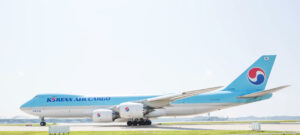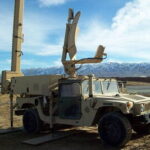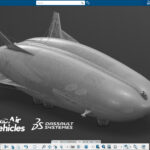Korean Air hopes to see the sustainable aviation fuel (SAF) industry infrastructure develop substantially to a point where the procurement procedure can become more streamlined, and the costs come down significantly in the long-run, writes Keith Mwanalushi.
The airline is open to increasing its supply in the future, as the demand for SAF grows in the region.
So far, around 43 airlines have committed to different SAF uptake levels, going from 5% to 30% by 2030, according to recent data by IATA.
Korean Air’s journey towards decarbonising the air cargo supply chain received another boost last month following the signing of an agreement with Japanese firm Yusen Logistics. The aim is to promote the use of SAF in collaboration with shippers and forwarders.
Korean Air launched the programme in September last year to promote SAF usage within the Asian region in alignment with the aviation industry’s climate change goals. “Achieving net zero will require consistent and close collaboration among multiple stakeholders, including governments, airlines, refiners, operations, and logistics companies,” Jae Dong Eum, senior vice president, and head of cargo at Korean Air, tells FINN.
The programme is designed to meet the rising demand of the airline’s global air cargo customers to participate in carbon emissions reduction activities and to promote meaningful solidarity and sustainable change in the global aviation industry.
Additionally, with Yusen Logistics joining the programme, Eum feels it sends a clear message that there is demand for SAF in Asia. The programme works by customers purchasing SAF for air cargo operations, and then Korean Air shares the carbon emissions reductions with its customers – reportedly a first of its kind in the Korean air cargo market.
“In order to ensure the sustainability of the air cargo industry in the long term, significant investments will need to be made in multiple areas, and those involved both directly and indirectly will need to recognise the need for sustainability and be willing to participate voluntarily,” Eum adds.
In June last year, Korean Air partnered with GS Caltex, a Korean energy and chemical company, to conduct test flights using SAF. Seemingly, test flights began in the second half of 2023 running for six months and the results are supposedly expected soon.
Decarbonisation is indeed a global effort and Korean Air sees an increased demand and growth for SAF, however, as Em highlights, to achieve industry-wide adoption, much more needs to be done to support the use of SAF.
Globally, SAF is still in short supply and also expensive, so challenges still persist with sourcing, supply, demand and cost. “At Korean Air, we are still relatively new to the field, and we are closely following the developments in the SAF market. We hope that the SAF industry will continue to grow and that the procedures and costs for SAF procurement will come down in the long run,” Eum comments.
As local reports suggest, the South Korean ministry of trade industry and energy – also known as Motie – is supporting the production and use of SAF in the country through various policies including setting quality standards for SAF in 2024 ahead of blend mandate preparations in 2026. According to Motie, six demo flights using SAF on cargo operations between Seoul and Los Angeles are now completed.

According to S&P Global, a commodity insights specialist, the global SAF supply will reach 2.13 million metric tonnes in 2024, of which 2.03 million will be HEFA-produced SAF. However, global SAF demand consistently lags supply, estimated at 1.24 million metric tonnes in 2023 and rising to 2.156 million metric tonnes in 2024.
Airlines looking to cut emissions will likely evaluate replacing older fleets in addition to investing in SAF.
According to fleet data from AviationValues, Korean Air Cargo operates a fleet four B747-400Fs, seven B747-8Fs and 12 B777-200LRFs.
Eum recognises the airline’s efforts to actively introduce and operate highly efficient freighters to reduce carbon emissions. Of the 23 freighters currently operated by Korean Air, 19 are next-gen freighters such as the B777F and B747-8F, which already have relatively low carbon emissions per flight.
He says to further reduce carbon emissions from cargo transportation, the airline plans to progressively introduce additional partner suppliers for sustainable aviation fuel and new next-generation aircraft to its fleet.
Korean Air is also exploring and executing procedures, such as a complete transition to e-AWB, using lightweight containers and recycled protective sheets, and expanding the use of electric ground handling equipment. The commitment to reduce environmental footprint is multi-faceted, Korean Air indicates it will continue seeking and implementing technologies and procedures to reduce air cargo’s environmental impact.
Top image: (From left) Eisuke Fukagawa, Global Head of Air Freight Forwarding Group, Yusen Logistics Co., Ltd. and Jaedong Eum, Senior Vice President and Head of Cargo Business Division, Korean Air
Subscribe to the FINN weekly newsletter

